I met up in New York with Bertrand Tavernier and Antonin Baudry, who co-wrote the screenplay for The French Minister (Quai d’Orsay), based on Baudry's (aka Abel Lanzac) autobiographic graphic novel about his adventures as a speech writer in the French Ministry. The film stars Thierry Lhermitte, Raphaël Personnaz and Niels Arestrup who at times seem to channel the working methods of Cary Grant and Rosalind Russell in His Girl Friday or the serious madness surrounding Peter Sellers in The Party. Howard Hawks, Billy Wilder, Blake Edwards, Jacques Becker, Stanley Kubrick and John Ford pop up in precise reference throughout the conversation.
Anne-Katrin Titze: The English title of the film is different from the graphic novel.
Antonin Baudry: It's Quai d'Orsay in French [for both film and graphic novel]. In English, the title of the book is Weapons Of Mass Diplomacy and the title of the film is The French Minister.
AKT: Are you happy about that?
AB: I'm very happy. Different audiences.
AKT: Watching the film, I was reminded of movement in two other movies. One was by Howard Hawks, His Girl Friday (1940), especially the scene at the beginning with Cary Grant walking through the office and Rosalind Russell following him. The other one was the placement of the desk in everybody's way which reminded me of Blake Edwards' The Party (1968) with Peter Sellers. How much did movement factor into the comedy? It's a film about language but also movement.
Bertrand Tavernier: His Girl Friday also was a film about language and comedy. I did not see any film while working on the screenplay and preparing the film. But I knew them, I had seen them many times before. It's true, I had in mind the rhythm of His Girl Friday. Without looking at a specific scene. The delivery of the lines was not imposed on the characters but generated by the characters. Like One, Two, Three, the comedy by Billy Wilder.
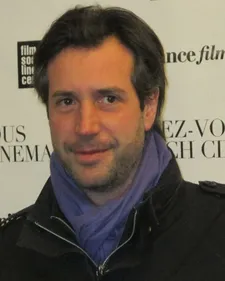 |
| Antonin Baudry, co-screenwriter The French Minister (Quai d’Orsay): "The film is for me kind of autobiographical because the character of Arthur is exactly what I lived ten years ago." |
The Party, I remember very well but I never thought about that specific scene. That scene was born out of the decor. This was the only place where we could seat Arthur (Raphaël Personnaz in The French Minister), at the end of that table. And then he would have to be knocked down by the door and people. I thought about The Party in one sense. It's a farce, but all the people around Sellers are written rather realistically. The producer is behaving like a typical Hollywood producer. The western actor is behaving like a western actor. Even if they are prototypes they have a certain kind of realism. The only thing which destroys that is the character of Sellers with a kind of madness.
I was thinking of The Party when I was saying to most of the actors, you are not acting in a comedy. You must act in a really sincere way. You never think that you are funny, except when the Minister is doing a joke about NATO, repeating those stupid lines. Then he must give an impression that he knows he is funny. Everybody pretends to laugh at this moment.
AB: Can I add something? It never occurred to me. I never thought of The Party when we were writing, ever. The film is for me kind of autobiographical because the character of Arthur is exactly what I lived ten years ago. My best friend in America here in New York always says to me "I can't believe you're a diplomat. You're so clumsy. And you look exactly like Peter Sellers in The Party." So when you said that, I thought, ha, the subconscious thing… He is my best friend.
AKT: So he knows. Howdy, partner.
BT: Birdie, Birdie Num Num!
AKT: Birdie Num Num, right. Also, thinking about His Girl Friday, it's a film about work. After watching your film I wrote down love story about work.
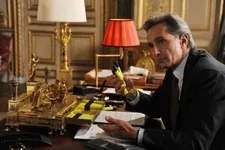 |
| Bertrand Tavernier on the yellow markers used by Alexandre Taillard de Worms: "Dominique de Villepin said on the radio that that was his system of working." |
BT: Yes, yes, yes. This is a good description. Work had always fascinated me. In all the films I've done people are really working. The cops of L.627, the jazz musicians in 'Round Midnight, the character in Life And Nothing But, trying to find a missing person. That's why I fell in love immediately with Antonin's book, because it was dealing with politics in, for me, the best way possible. For many people, politics is what you see on television, which is the opposite of work. Attitude is not work. And people judge on attitude, not on work.
AKT: Television actually does everything so that you don't see the work.
BT: Absolutely! Absolutely, hide the work! They don't want to talk about it so they organise polls about which of the two candidates is the most sympathetic. It's not about the program or what they want to do, it's about his smile or was his tie suited to the shirt. We are doing the opposite. We are talking about the people TV would never show. The people who are working sometimes in hectic conditions. They work in the chaos, sometimes 18 hours in the office. The Chief of Staff is a legend in the French Ministry [in the film he is called Claude Maupas, played by Niels Arestrup]. I was talking to some gendarmes and they said, 'we never see him leave the building before 4 or 4:30 in the morning.'
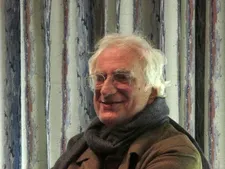 |
| The French Minister (Quai d’Orsay) director Bertrand Tavernier: "I had fun with the characters - it's a gentle ironic look at them but never condescending, never patronising." |
AB: Actually you may know him because the real person who inspired this character is a former ambassador to the US. He is Pierre Vimont, you may have met him. He is a real model of a civil servant, totally dedicated, he is really a hero.
BT: He is somebody who knows everything. He has a better knowledge than most of the French congressmen. Whenever it's about Palestine, Israel, the Far East, Africa, he knows - which is not the case with many French politicians who don't seem to know what they are talking about. I had fun with the characters - it's a gentle ironic look at them but never condescending, never patronising. I immediately told Antonin if I was adapting it, the most important thing was to avoid being cynical.
Or the feeling that my camera is superior to the characters. I'm with them. The same way Hawks was with his newspaper. Or Jacques Becker, who did some of the best French comedies ever done. It has the same sense of reality, being funny with it and never reverent. That's what I loved in the work of Antonin and Christophe Blain.
AKT: The story is based on your life, Antonin. How do you feel about calling the film a love story about work? Did you love the work you were doing at the time in the ministry?
AB: I don't know what life is about except for love and work. What else is there?
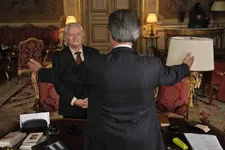 |
| Niels Arestrup as Claude Maupas: "The Chief of Staff is a legend in the French Ministry." |
AKT: Some people hate their work.
AB: All the people I was working with really loved their work even if they were complaining all day. Even if they were suffering.
BT: The guy who was complaining about the food? He loves what he does. He thinks nobody ever understands the complexity of the situation.
AB: Your whole life is inspired by this work. It's a kind of claustrophobic ambiance of work when you're together 24/7, always reacting to some crisis somewhere in the world. You're like in a small boat all together. [I imagine Life of Pi] Sometimes you explode, sometimes you're satirical, but we loved each other.
AKT: The story is also about writing and rewriting and rewriting and rewriting. Is that also mirroring your process for the film?
BT: We didn't do 19 or 20 drafts. We wrote it very quickly. But after, even when I was shooting, I was calling Antonin about a little detail I wanted to change, I was always, always rewriting. First we were reading what each other was writing which makes us completely different from the Minister, who never reads what is submitted to him. Never.
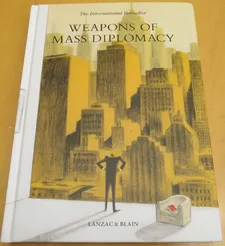 |
| Antonin Baudry on Weapons Of Mass Diplomacy: "Sometimes you explode, sometimes you're satirical, but we loved each other." |
AB: He transforms it without reading it. It is the performance.
AKT: With yellow markers everywhere?
BT: In fact the real character on which Taillard de Worms [played by Thierry Lhermitte] is based, [Dominique de Villepin] said on the radio that that was his system of working. When somebody is giving you an idea, you must say it's very very bad, because it creates a link. I don't know if it's a good method, you have to have the patience. I know, I would not have lasted ten minutes there. Antonin must have the patience. To have two or three speeches, which are difficult to write, entirely thrown away without even a look. There's a line I love that Raphaël Personnaz [as Arthur, Antonin Baudry's alter ego] says: "Does he read?"
AB: The fact is that the Minister already knows it's not good. He knows that the first version of a speech cannot be good.
AKT: Did you know that he knew?
AB: I learned.
BT: He's like Stanley Kubrick, who said the first 14 takes do not count. It's a method. John Ford only used first takes and his films are not bad either.
In the second half of my conversation with Bertrand Tavernier and Antonin Baudry, we learn about the ego of many French politicians, working with cats, shoe obsessions, Eric Rohmer, Jean-Luc Godard and going beyond Mel Brooks with Frankenstein And The Seven Dwarfs.
On July 2 in New York, Antonin Baudry will be in conversation with Edmund White and Frank Rich on Drawing The Line presented by McNally Jackson Books.








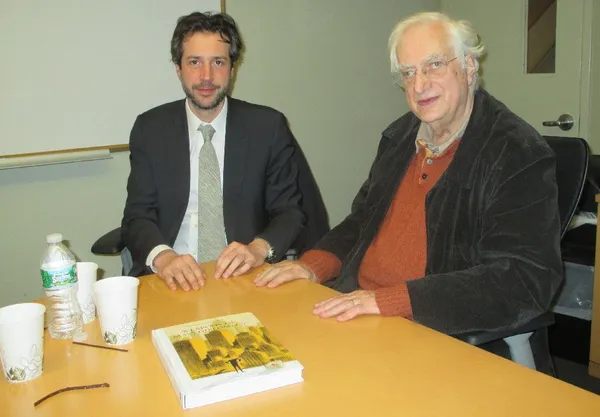
![Thierry Lhermitte as Alexandre Taillard de Worms with Raphaël Personnaz as Arthur Vlaminck: "There's a line I love that Raphaël Personnaz [as Arthur, Antonin Baudry's alter ego] says: 'Does he read?'"](/images/newsite/globe_225.webp)













